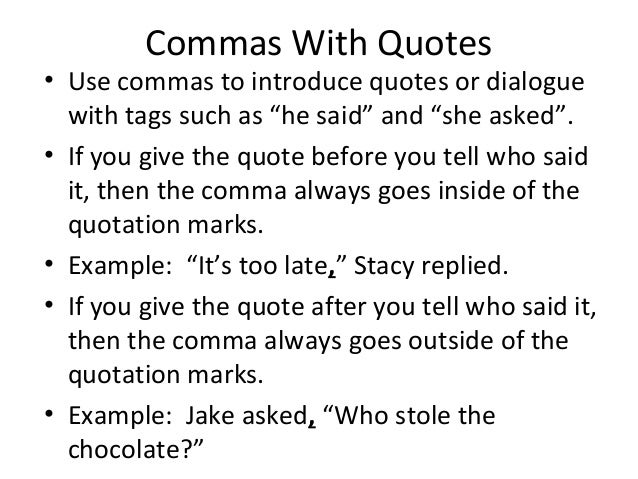Comma before or after thus the definitive guide
Table of Contents
Table of Contents
Are you unsure whether to place a comma before or after quotes? Don’t worry; you are not alone. This is a common issue that many people face, and it can be confusing to get it right. However, understanding when to include a comma before or after quotes is essential, especially when writing formal documents or academic essays. In this post, we will explore everything you need to know about Comma Before Or After Quotes.
Pain Points of Comma Before Or After Quotes
Have you ever received feedback from your professor or boss, stating that your punctuation is incorrect? Punctuation is a crucial aspect of writing, and improper usage can make your work look unprofessional. Comma usage before or after quotes is one of the most common punctuation errors that writers make. Using the wrong placement can change the meaning of your sentence and make it less clear to readers. It’s important to understand the correct usage of commas to avoid confusing your readers.
What is Comma Before Or After Quotes?
Comma Before Or After Quotes refers to the placement of commas when using quotations in a sentence. The general rule is that a comma should be placed before the opening quotation mark to introduce the quote. Similarly, when the quotation ends, a comma should be included within the quotation mark to separate it from the rest of the sentence. This rule applies to most situations but can vary depending on the context and usage of quotes.
Summary of Main Points
In summary, Comma Before Or After Quotes is essential punctuation that writers must understand. Failure to use commas correctly can lead to confusion, and it’s crucial to pay attention to detail when editing your work. Remember that commas should be placed before and after quotes in most situations, although the rules can vary depending on the context.
Comma Before Or After Quotes in Real Life
Personal experience of using Comma Before Or After Quotes is different for every writer. I was once editing my friend’s blog post, and I realized that she was using commas incorrectly when using quotes. She had placed commas outside of the quotation mark, which changed the meaning of her sentence. After correcting her mistakes, she re-read her work and realized how important it was to get commas right. She kept practicing until she mastered this skill, and her writing looked more professional as a result.
 Comma Before Or After Quotes in Formal Writing
Comma Before Or After Quotes in Formal Writing
In formal writing, such as academic essays or business letters, comma usage before or after quotes is essential. Failing to include a comma in the right place can alter the meaning of a sentence, which can be detrimental in professional contexts. It’s important to pay attention to detail when writing, ensuring that commas are used correctly. Additionally, it’s essential to understand the formatting of quotes in different writing styles, such as APA or MLA.
 ### Advanced Comma Usage
### Advanced Comma Usage
In some cases, comma usage before or after quotes can be more complicated. For example, when using a quote within a quote, different comma placements are required. When using quotes with multiple sentences, different rules must be followed. These advanced usage scenarios can be tricky for writers, and it’s essential to understand the rules in detail to ensure the correct use of commas.
 #### Common Mistakes in Using Comma Before or After Quotes
#### Common Mistakes in Using Comma Before or After Quotes
One of the most common mistakes in using Commas Before or After Quotes is applying a comma before the quotation mark, which should not be there. Another mistake is forgetting to put a comma inside the closing quotation mark, which can also be detrimental to readers’ comprehension. To avoid these mistakes, it’s recommended to understand the rules of using Commas Before or After Quotes comprehensively.
Question and Answer
Q1: When should a comma be placed before a quote?
A1: A comma should be placed before a quote when it is being introduced and integrated into a sentence.
Q2: Does the comma placement vary for different writing styles?
A2: Yes, the rule of Comma Before Or After Quotes might vary depending on different writing styles such as APA, MLA, or Chicago, among others.
Q3: Can incorrect commas change the meaning of a sentence?
A3: Yes, using the wrong comma placement can alter the meaning of sentences and make them less clear to readers.
Q4: Are there advanced usage rules for Comma Before Or After Quotes?
A4: Yes, when using quotes within quotes, quotes with multiple sentences, or quotes within parenthetical citations, different comma placements are required.
Conclusion of Comma Before Or After Quotes
In conclusion, Commas Before or After Quotes is a crucial topic that writers must understand. Using proper commas can significantly improve the clarity of writing and make it look professional. Most of the rules of Comma Before Or After Quotes are consistent, but there are some exceptions, especially when it comes to advanced usage. Thus, understanding the rules comprehensively is crucial to avoiding common mistakes and writing with confidence.
Gallery
Comma Before “after All”: The Complete Guide

Photo Credit by: bing.com / comma considered nuances decision highlight
Comma After A Quotation — A Comprehensive Guide

Photo Credit by: bing.com / comma mentioned suggests quoted linguablog
Comma Before Or After “thus”: The Definitive Guide

Photo Credit by: bing.com / comma definitive
Comma With Quotes Rule And Grammar Practice 10 16-14

Photo Credit by: bing.com / comma quotes commas grammar rule use dialogue such practice introduce
Do You Put A Comma Before A Quote - ShortQuotes.cc

Photo Credit by: bing.com / comma quotation quotations punctuation sentence basecampatx shortquotes





